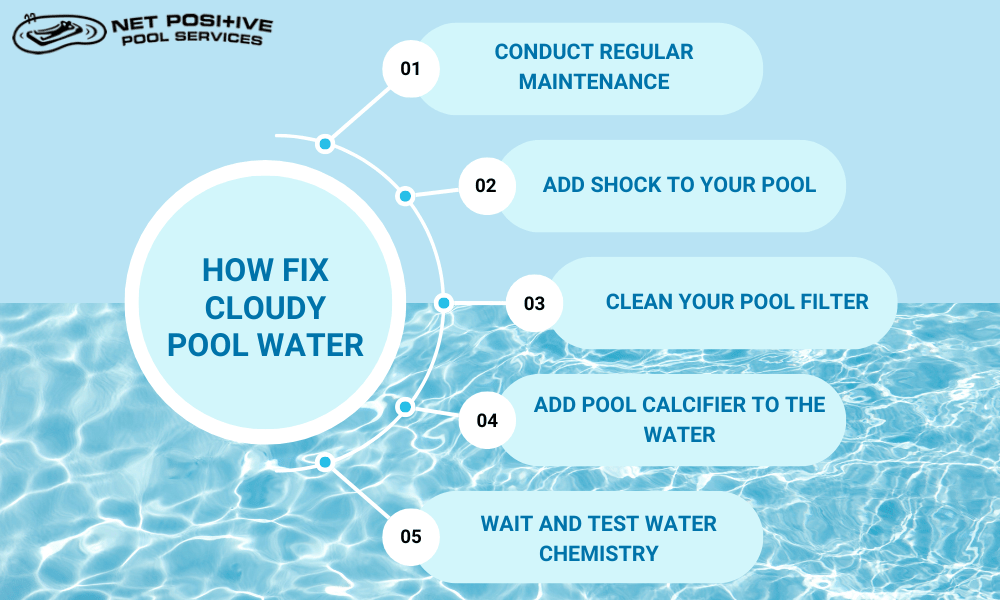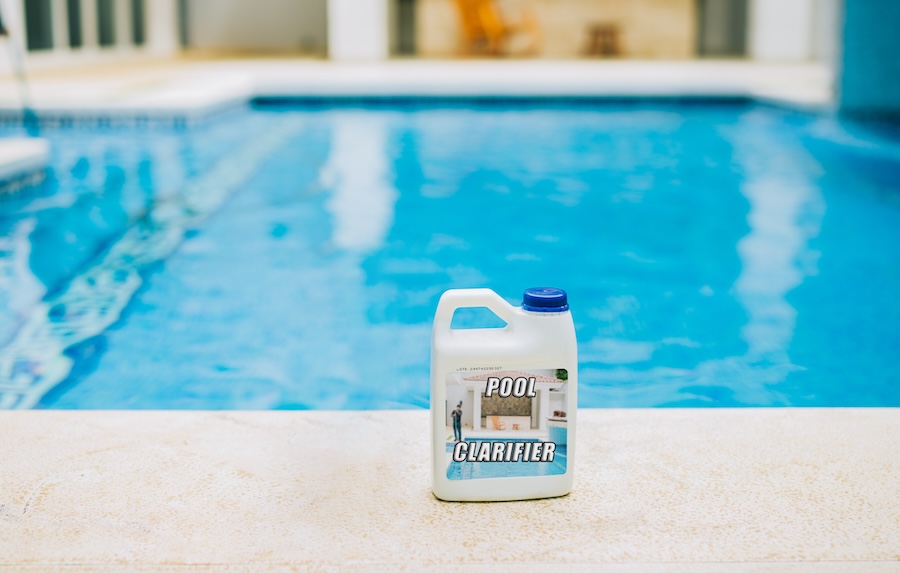Cloudy pool water can be frustrating for any pool owner. It turns your sparkling oasis into something less inviting. In most cases, cloudy pool water is a sign that something is off, whether it’s a problem with your pool’s filtration system, an imbalance in the water chemistry, or other environmental factors. Luckily, with the right knowledge, cloudy pool water can be cleared up, so you can get back to enjoying your pool.
What Causes Cloudy Pool Water?
Cloudy pool water doesn’t happen for no reason. It is usually a symptom of underlying issues that need to be addressed. Here are the main causes of cloudy pool water:
Filtration System Needs Attention
The most common reason for cloudy pool water is poor filtration. Your pool’s filtration system is responsible for removing dirt, debris, and small particles from the water. When your pool filter isn’t working efficiently, it can leave behind small particles that cloud the water. This can happen if the filter is clogged, the pump is malfunctioning, or the system is too small for the size of your pool.
Signs of Poor Filtration:
- Low water flow from the pump
- Dirty or clogged filter
- Pool water remains cloudy even after regular cleanings
Chemical Imbalances
Something else that usually contributes to your pool water being cloudy is an imbalance in pool chemicals. The most important chemicals to keep an eye on are chlorine, pH, alkalinity, and cyanuric acid. If any of these are off, they can lead to cloudy water, algae growth, or even harmful bacteria.
- Chlorine: If your chlorine levels are too low, the pool will struggle to kill bacteria and break down organic matter, leading to murky water.
- pH: High or low pH can make the pool water less effective at sanitizing and can even cause calcium deposits, which can lead to cloudiness.
- Alkalinity: If your pool’s alkalinity is out of balance, it can cause pH fluctuations, making it hard to maintain clear water.
- Cyanuric Acid: Low levels of cyanuric acid can cause the chlorine to evaporate too quickly, which means your pool water isn’t getting properly sanitized.
Algae Growth and Organic Matter
Algae and organic matter like leaves, dirt, and bugs can cloud up your pool water. Algae thrive in warm, unbalanced pool water, and once it starts growing, it can be tough to get rid of. The presence of algae can lead to cloudy water, and in more severe cases, it can turn your pool into a green mess.
Common Signs of Algae Growth:
- The color of your cloudy water is greenish instead of white
- Slippery surfaces on pool walls or floor
- A musty smell around the pool
Environmental Factors
Things like heavy rainfall, high winds, or even nearby trees can contribute debris that clouds the water. If there’s a lot of organic matter entering the pool, it can cause a buildup of small particles that the filter struggles to catch. In areas where dust and pollen are common, these particles can make their way into your pool and cloud the water.

How to Fix Cloudy Pool Water
If your pool is looking cloudy, don’t worry. There are a number of ways to clear up the water and restore your pool’s crystal-clear look. Below are steps you can take to address the problem and keep your pool clean.
1. Test Your Water Chemistry
The first step in fixing cloudy pool water is testing your water chemistry. You can use a pool test kit or have your water professionally tested at a pool supply store. The most important factors to check are:
- Chlorine Levels: Your chlorine levels should be between 1-3 ppm (parts per million) to ensure proper sanitation.
- pH Level: The ideal pH level for pool water is between 7.4 and 7.6. If it’s higher or lower, adjust accordingly.
- Alkalinity: Alkalinity should be between 80-120 ppm.
- Cyanuric Acid: Your cyanuric acid levels should be between 30-50 ppm. If it’s too low, the chlorine will be less effective.
2. Shock the Pool
If the water chemistry seems fine, but your pool is still cloudy, it’s time to shock the pool. Shocking your pool involves adding a large dose of chlorine to break down organic matter, kill bacteria, and address algae growth.
How to Shock the Pool:
- Test the chlorine levels to ensure the pool water isn’t already too high in chlorine.
- Follow the manufacturer’s instructions on the shock treatment product you’re using. You can find pool shock treatments with calcium hypochlorite or other chlorine-based chemicals.
- Add the shock treatment to the pool while the pump and filter are running to ensure the chemical is properly circulated.
- Allow the pool to sit for at least 8 hours before testing and swimming again.
3. Clean Your Pool Filter
Your pool filter plays a key role in keeping the water clear, and it’s important to make sure it’s working properly. If your filter is clogged or hasn’t been cleaned in a while, it won’t be able to remove the particles causing cloudy water.
Steps to Clean Your Pool Filter:
- Sand Filter: Backwash the sand filter to remove debris and particles. If the water pressure is high, it’s a sign the filter needs to be cleaned.
- Cartridge Filter: Remove the cartridge and hose it down to remove dirt and debris.
- D.E. Filter: Add fresh diatomaceous earth (D.E.) powder to the filter after cleaning.
If your filter is still not working well after cleaning, it may need to be replaced. Check the manufacturer’s guidelines to determine when to replace your filter.
4. Use a Pool Clarifier
If your pool is still cloudy after testing the water and cleaning the filter, a pool clarifier can help. Pool clarifiers work by causing small particles to clump together, making them easier for the filter to remove. This can clear up cloudy water that is caused by fine particles that your filter is struggling to catch.
How to Use a Pool Clarifier:
- Add the clarifier to the pool according to the manufacturer’s directions.
- Run the pool pump for several hours to allow the clarifier to work its magic.
- Clean the filter again after using the clarifier to remove the clumped particles.
5. Maintain Your Pool Regularly
Once your pool is back to clear water, it’s important to maintain it regularly to prevent cloudiness from coming back. Regular maintenance includes:
- Testing and balancing the water chemistry once a week.
- Checking the pool filter and skimmer basket.
- Keeping debris out of the pool with a cover, leaf net, or skimming net.
- Running the pump for at least 8 hours a day to ensure proper circulation.
- Shocking the pool periodically, especially after heavy rainfall or a lot of pool activity.
By staying on top of your pool’s water chemistry and maintenance, you can prevent cloudy water from becoming a recurring issue.

How to Know You Need Professional Help for Cloudy Pool Water
While many pool owners can manage cloudy water issues on their own, sometimes it’s best to call in a professional. If you’ve tried the steps above and your pool remains cloudy, it may be time to bring in the experts.
Persistent Cloudiness Despite DIY Efforts
If you’ve tested the water, shocked the pool, and cleaned the filter but the water remains cloudy, it could be a sign of a deeper issue. Persistent cloudiness may indicate problems with the filtration system or a serious chemical imbalance that requires professional equipment and knowledge to fix.
Filter System Issues
If your pool filter is clogged or malfunctioning, it may not be able to clear out particles, no matter how many times you clean it. A professional will have the tools and knowledge to assess whether your filter needs to be repaired or replaced.
Complex Water Chemistry Problems
Sometimes, achieving the correct water balance can be tricky, especially when dealing with issues like high calcium hardness or inconsistent pH. If you’re struggling to get your pool’s chemistry in line, a professional pool service can perform a more thorough water analysis and treatment.
Algae or Bacteria Problems
In some cases, algae or bacteria could be present in your pool water, which can make the water cloudy and unsafe to swim in. A pool professional can help identify and treat these problems with the right chemicals and equipment.
Trust the Experts for a Clear, Healthy Pool
Cloudy pool water can be caused by several factors, but the good news is it’s usually easy to fix. From testing and balancing the water chemistry to shocking the pool and cleaning the filter, there are plenty of DIY methods to get your pool clear again. However, if the cloudiness persists, it may be time to call in the experts.
At Net Positive Pools, we specialize in all aspects of pool maintenance, from water chemistry to filter system repairs. Our team of professionals can help restore your pool to its clear, sparkling best. If you need assistance, don’t hesitate to reach out to us today for expert pool cleaning and maintenance services. Keep your pool clear and your water balanced with Net Positive Pools!


